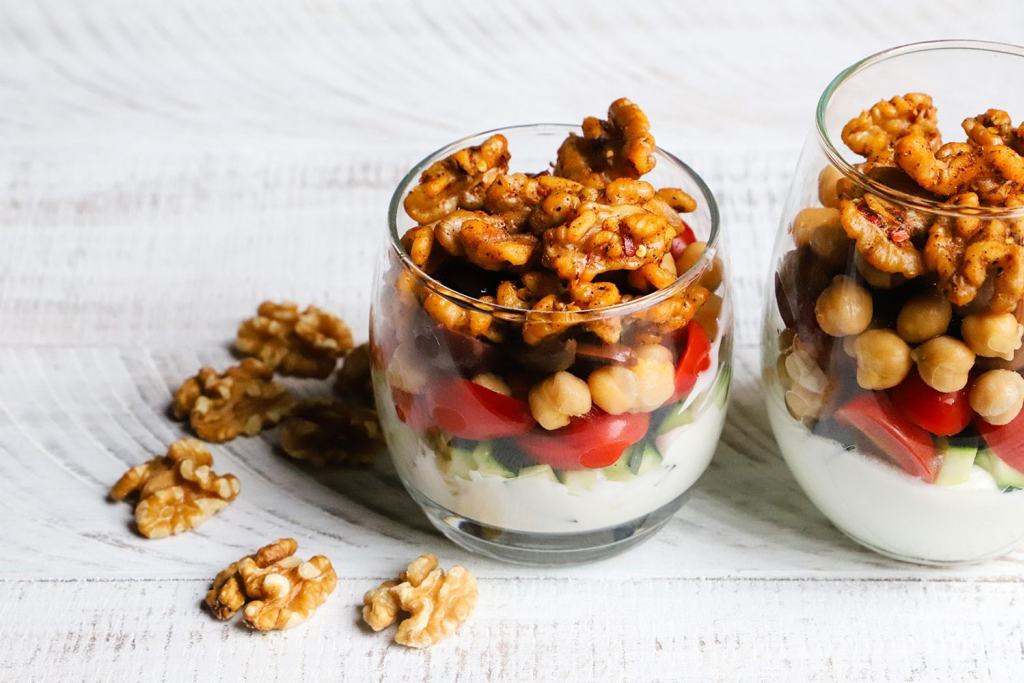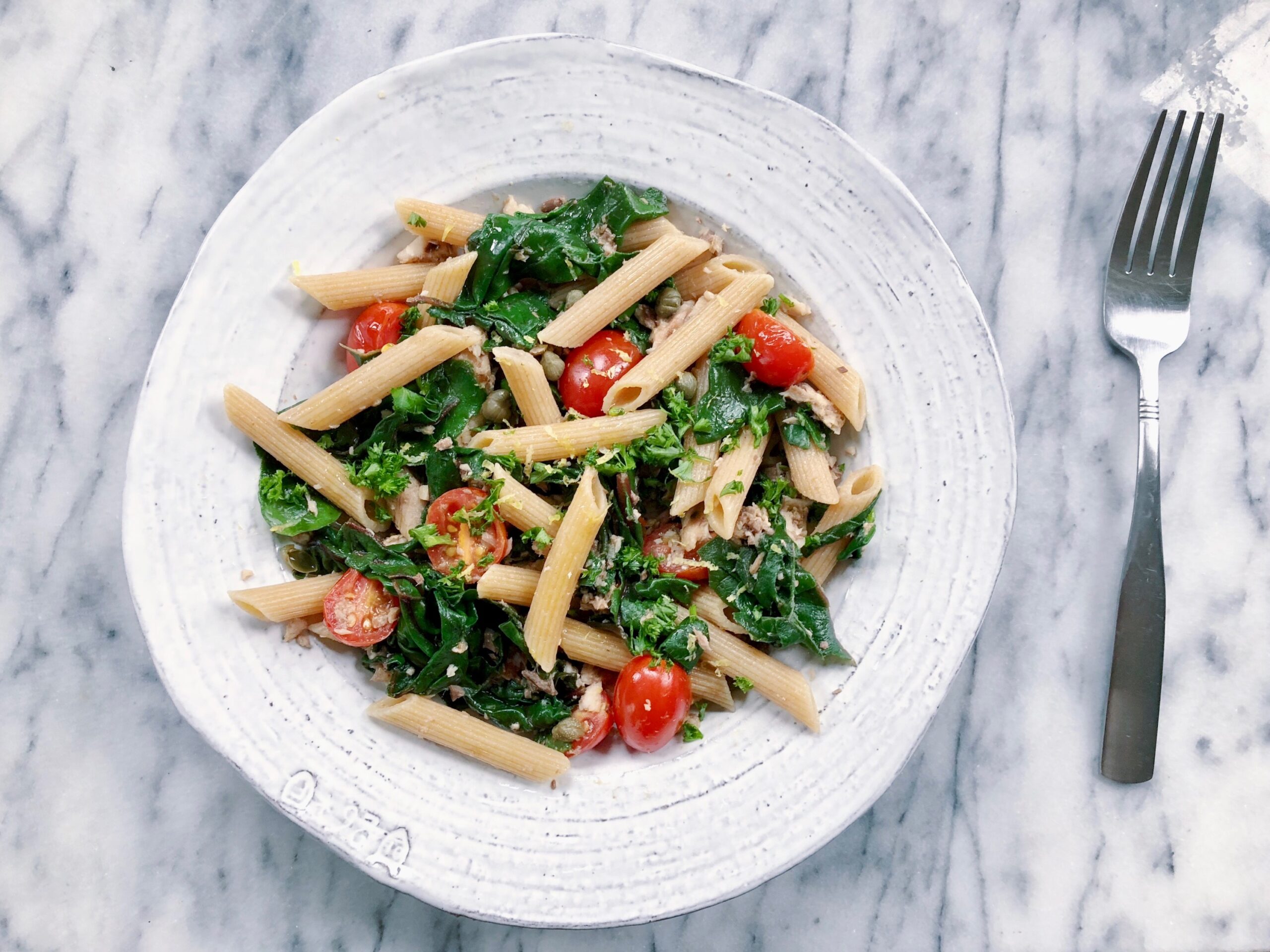As one of the most well-studied eating patterns in the world, the Mediterranean Diet has more than 5 decades of epidemiological and clinical research supporting its benefits. Notably, the major PREDIMED study demonstrated the Mediterranean Diet’s role in reducing cardiac events, and was even republished in 2018 with stronger randomization protocols in place, further strengthening the evidence on the health benefits of a Mediterranean Diet.
So what makes this way of eating so good for your heart? There are many factors, of course, but here are a few Mediterranean habits you can adopt to support a heart-healthy lifestyle.
1. Embrace healthy fats
Did you know that in the traditional Greek/Cretan diet, more than 35 percent of calories came from fat? When it comes to eating fat on the Mediterranean Diet, it’s the type that matters.
The Mediterranean Diet limits saturated fat, which typically comes from animal products like red meat and butter. Instead, it emphasizes sources of unsaturated fats. This type of fat can help reduce bad cholesterol levels in your blood, which can lower your risk of heart disease and stroke. It also provides nutrients to help develop and maintain your body’s cells.
Let’s take a look at three sources of unsaturated fat: olive oil, nuts, and fish. Making your diet heart-healthier starts with simply swapping in these ingredients!
Olive oil is the heart and soul of the Mediterranean Diet. Instead of butter or highly processed oils, use extra virgin olive oil as your main cooking oil, from sauteing, to grilling, to roasting, to pan-frying. Cook your eggs in olive oil, roast your vegetables in olive oil-you can even bake with olive oil!
Mediterranean nuts-almonds, chestnuts, hazelnuts, pine nuts, pistachios, and walnuts-and peanuts are nutrient-dense foods that offer heart-healthy unsaturated fatty acids, protein, fiber, vitamins, minerals, and polyphenols (antioxidants found in plants), and are emphasized in various forms of the Mediterranean Diet.
Walnuts in particular are a versatile ingredient and heart-healthy food. In fact, walnuts are certified through the American Heart Association’s Heart-Check program, and three decades of research has shown walnuts can support cardiovascular health and lessen the risk for cardiovascular disease. The latest research shows walnuts may lower cholesterol and increase longevity. A study published in Circulation explored the effects of a walnut-enriched diet on overall cholesterol in elderly individuals, and researchers found an association between regular daily walnut consumption and sustained lower levels of cholesterol-including a 15 percent lower risk of cardiovascular disease. Additionally, researchers from Harvard T.H. Chan School of Public Health looked at the link between higher walnut consumption – both in terms of the amount and frequency – and longer life expectancy. The study found that eating five or more servings (one serving = one ounce) per week was associated with a 14% lower risk of death (from any cause), 25% lower risk of dying from cardiovascular diseases, and a gain in about 1.3 years of life expectancy, compared to those who didn’t consume walnuts. The study suggests that even a few handfuls of walnuts per week may help promote longevity.
Ready to use more nuts in your cooking? Check out this blog on how to use nuts for breakfast, lunch, and dinner! You can also learn more about the latest heart health research and California walnuts.
To get enough heart-healthy omega-3 fatty acids in your diet, try adding a handful of walnuts to your morning cereal. Walnuts are the only nut that provides an excellent source of the plant-based omega-3 ALA (2.5g/oz), which may support heart health, and try swapping out meat with seafood two times per week. Says Penny Kris-Etherton, PhD, Distinguished Professor of Nutrition at Penn State University: “Including fish and seafood is especially beneficial for prevention of heart disease through multiple mechanisms including: lowering blood pressure and heart rate, improving blood vessel function, and, at higher doses, lowering triglycerides and lessening inflammation.”
To get started cooking with more fish and seafood, try these Sardine Patties with Dill Yogurt Sauce, Baked Snapper with Tomatoes and Olives, or Salmon Meatballs with Cucumber Yogurt.
2. Balance Your Plate-Start with a Healthy Pasta Meal!
At Oldways, we say that the Mediterranean Diet is greater than the sum of its parts-endless, delicious combinations of grains, fruits, vegetables, healthy fats, seafood, herbs and spices that support your health over time. One fantastic way to start building a varied, delicious plate? Pasta meals!
Recent data are now showing that a popular Mediterranean staple food, pasta, may offer a unique benefit when it comes to heart health. Specifically, a Barilla-supported study in the BMJ, Nutrition, Prevention & Health evaluated nearly 85,000 postmenopausal women and found that pasta, when eaten in moderation (approximately 3 times per week), may be benefficially associated with heart health outcomes, including reduced long-term risk of stroke and atherosclerotic cardiovascular disease.
Data also show that eating pasta may help people better adhere to the Mediterranean Diet. Plus, those who eat more pasta meals appear to have a lower BMI, waist circumference, waist to hip ratio, and lower chance of being overweight and obese, regardless of the adherence to the Mediterranean diet, according to the same data published in Nutrition & Diabetes.
At Oldways, we also think of pasta as a delicious canvas and an ideal partner for even more heart-healthy foods, like vegetables, beans, herbs, and olive oil. Nuts, fish, and small amounts of meat or cheese can also be added for extra flavor and protein. Pasta’s versatility allows for almost endless preparations-browse our recipe library for some inspiration!
3. Enjoy Activity and Movement
At the base of the Mediterranean Diet-its foundation-is physical activity. Traditionally, people in the Mediterranean were active on a daily basis, and we should aim for that, too.
But there’s no need to buy expensive exercise clothes or join a fancy gym (unless, of course, you would like to!) Walking was a major source of physical activity for most people in the Mediterranean, and it remains a wonderful way to get moving every day. Try taking a walk before you start your morning, or during your lunch break. Take a loop around the neighborhood while you talk on the phone, or take your dog on an extra walk in the afternoon.
Dancing, gardening, yoga, and online exercise videos are a few more fun ways to get a little more activity in your day-to-day routine! Find a fitness practice that you enjoy, and you’ll be much more likely to stick with it. Regular exercise is an important way to take care of your heart health.
4. Maintain Your Social Connections
Sharing meals with others is also at the foundation of the Mediterranean Diet. When you can, take time to slow down, cook a meal with your loved ones, and share it around the dinner table.
In fact, UNESCO states that “eating together is the foundation of the cultural identity and continuity of communities throughout the Mediterranean basin. It is a moment of social exchange and communication, an affirmation and renewal of family, group or community identity.”
Eating together can help reduce stress, build family relationships, and improve the quality of food choices, as well as the quantity (better portion control) Frequent family meals have also been related to better nutritional intake. Check out our Simply Mediterranean post for more information-a family meal does not need to be complex in order to have great benefits!
February is the perfect time to take an extra focus on your heart health. Stock your pantry with olive oil, nuts, pasta, and other heart-healthy ingredients. Go for a walk on your lunch break. Aim to get your whole household around the dinner table at least once per week (and more if you can). And of course, we’re here to help! Browse our recipe collection for heart-healthy dishes, and join our Mediterranean Diet Facebook group for extra support and inspiration. Happy Heart Month!
Want biweekly Med Diet information and recipes in your Inbox? Sign up for our Fresh Fridays newsletter by clicking the Subscribe button at the bottom of this page!
Join the Make Every Day Mediterranean Club Facebook group for additional information and support









